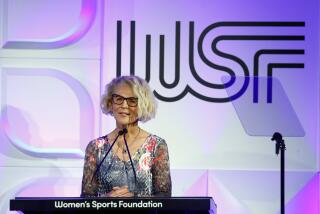Janet Evans Thriving at Stanford
STANFORD, Calif. — Janet Evans knew she was going to be asked, again, about the Olympics, and her eyes glazed over a little. After a long afternoon’s workout at deGuerre Pool she would rather have talked about the here and now--about Saturday’s meet between Stanford and Texas, the No.-1 and No.-2 women’s swimming teams.
“I know I’m really psyched up for it,” said Placentia’s Evans, holder of three world records, three American records and three gold medals from the 1988 Olympics. “If we do well against Texas, it’ll help our mind-set for the NCAAs, something we’re all looking forward to.”
Evans talked about her first year with the Cardinals--she has won 16 of her 22 races and finished no lower than third. Not coincidentally, she is 6-0 and has won 13 straight dual meets, dating back to the 1988 season. The team, rated No.-1 in women’s swimming all year, is coming off lopsided 104-36 and 117-16 wins over Arizona and Arizona State.
The Longhorns, 7-0 this season, are ranked second in the nation. They are led by Leigh Ann Fetter, Amy Shaw and Andrea Hayes, who will likely swim against Evans in the longer freestyle races. Handicapping the meet, Evans said, “We have to swim as fast as we can, and I think we’ll be able to do it.”
But then the subject turned, out of her hands, toward the 1988 Olympics in Seoul, when Evans was the designated pixie of the press, America’s Sweetheart, the high school senior from Placentia, Calif., who went from three gold medals to being Grand Marshal of both the Macy’s Thanksgiving Day Parade and the Fiesta Bowl. Those were the days when TV mini-cams would chase her around the campus at El Dorado High to get quotes, remembered Evans, who opted to come to Stanford after being wooed by a dozen schools, including Texas.
“Since I’ve come here I think the craziness has really died down,” said Evans, 18. “Sometimes someone will recognize me -- I can see them say to themselves, ‘Is that her?’ -- but they leave me pretty much alone.
“I really enjoy training with the team,” said Evans, adding that emotion for the dual meet against Texas is running high. “It’s just as intense as it was at the Olympics, even more intense. The difference at the Olympics is you’re just swimming by yourself -- here it’s the whole team, you’re all in it together.”
Evans, 5-6, 110, has qualified for the NCAA finals in four events since coming to Stanford -- the 500, 1000 and 1650-yard freestyle and the 400 individual medley. She has improved from a time of 2:08.35 in the 200 fly on Jan. 6 to a time of 2:04.61 two weeks later, from a time of 2:03.53 in the 200 free in December to a time of 1:50.71 on Jan. 26, and from a time of 9:45.41 in the 1000 freestyle Jan. 6 to a time of 9:32.63 against Arizona last weekend, only seven seconds off her American record.
“Against Arizona I was swimming my best,” said Evans, who practices up to five hours a day, a regimen she’s maintained for six years. To keep from drowning in boredom on the endless laps, Evans will talk to herself, “sing a song, think about how much homework I’ve got to do when I get back ...”
It’s been that way ever since junior high, she explained -- while her friends went to drive-ins and Friday night dances, she would be making another circle around the pool. “I used to think, ‘Look at all the things they get to do,’ but then look at the things I’ve been able to do that they haven’t, so it kind of balanced out.”
Evans wasn’t sure she was good enough to be a top swimmer until she went to the Goodwill Games in 1986 and barely missed making the world team. That’s when she realized “I really enjoy competing, seeing the rewards of working hard,” said Evans, adding, “For some reason I’ve always been better at distance. I’ve never been a sprinter.”
It wasn’t until she won gold medals at Seoul in the 400 individual medley, the 800-meter freestyle and the 400-meter freestyle -- setting the world record -- that America sat up and took notice, and ever since then Evans has been trying to get things back to normal. “I’m surprised at how genuine she is,” said swimming coach Richard Quick. “She doesn’t have one bone of prima donna in her.”
At the time Evans signed a commitment to come to Stanford last May, Quick said, “Obviously, I feel we’ve recruited one of the greatest athletes in American history ... the things that she has already accomplished are without precedent in United States swimming.”
If anything, he’s even more impressed since Evans has come to Stanford, explained Quick. “I’ve never seen anybody so consistent in the hours she puts into practice. She puts more time into swimming than anyone I’ve ever heard of”
Every serious swimmer puts in a lot of hours, said Evans, but it takes more than that. “A lot of it is in your head. You’ve got to have the confidence you can do it. I think 50 percent of it is in your head ... believing you can win.”
More to Read
Go beyond the scoreboard
Get the latest on L.A.'s teams in the daily Sports Report newsletter.
You may occasionally receive promotional content from the Los Angeles Times.






